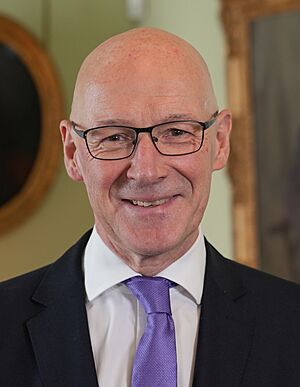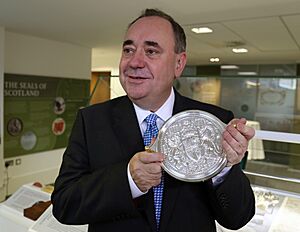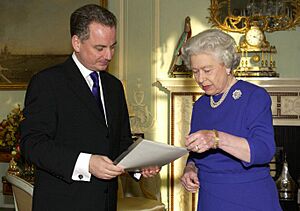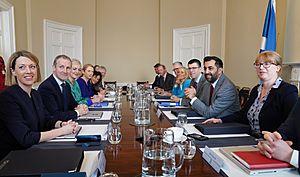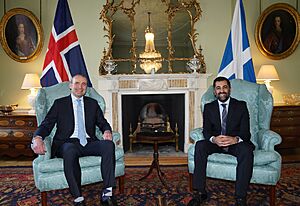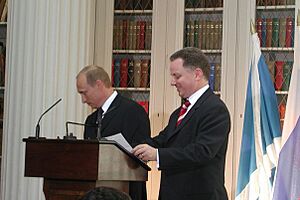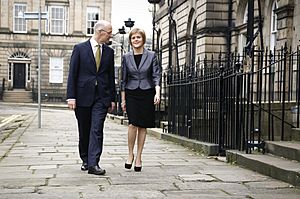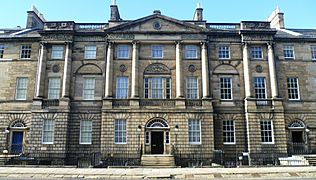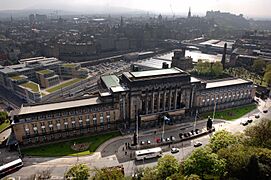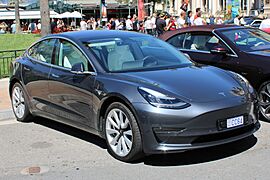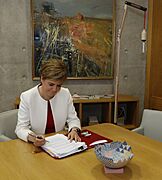First Minister of Scotland facts for kids
Quick facts for kids First Minister of Scotland |
|
|---|---|

|
|

Logo of the Scottish Government
|
|
| Office of the First Minister Scottish Government Scottish Cabinet Scottish Parliament |
|
| Style | First Minister (informal) The Right Honourable (UK and Commonwealth) His Excellency (international) |
| Member of |
|
| Reports to | Scottish Parliament |
| Residence | Bute House |
| Seat | St Andrew's House |
| Nominator | Scottish Parliament |
| Appointer | The monarch |
| Term length | At His Majesty's pleasure
(following nomination by the Scottish Parliament)
|
| Inaugural holder | Donald Dewar |
| Formation | 17 May 1999 |
| Deputy | Deputy First Minister of Scotland |
| Salary | £165,678 per annum (2023) (including £67,662 MSP salary) |
The First Minister of Scotland (Scottish Gaelic: Prìomh Mhinistear na h-Alba) is the main leader of the Scottish Government. This person is like the head of the government for Scotland. They lead the Scottish Government, which is the part of the government that makes decisions and carries them out.
The First Minister also chairs the Scottish Cabinet, which is a group of top ministers. Their main job is to create and share the Scottish Government's plans and ideas. They also promote Scotland around the world. The Scottish Parliament chooses the First Minister, and then the King or Queen officially appoints them.
The First Minister chooses other ministers for the Scottish Cabinet. They are also in charge of appointing Scotland's top legal officers, like the Lord Advocate. The First Minister is directly responsible to the Scottish Parliament for their actions. They are supported by a Deputy First Minister and other staff.
Currently, John Swinney is the First Minister. He is also a Member of the Scottish Parliament (MSP) for Perthshire North. He became First Minister on May 7, 2024, and was sworn in the next day.
Contents
History of the First Minister
After a special vote in 1997, the Scottish Parliament and the Scottish Government were created. This was done by the UK Parliament. This change was called devolution. It gave Scotland more home rule (self-governance) over its own matters. These include things like health, education, and justice.
The role of First Minister was created as the leader of this new Scottish Government. Since 1999, the Secretary of State for Scotland in the UK Government has had a smaller role. This is because many responsibilities moved to the Scottish Parliament and Government.
How the First Minister is Chosen
Becoming First Minister
The Scottish Parliament chooses the First Minister at the start of each new term. They do this by voting among all the members. After the Parliament chooses someone, the King or Queen officially appoints them.
Usually, the leader of the party with the most seats in Parliament becomes the First Minister. This is because the government needs the support of Parliament to do its job. There is no set time limit for how long a First Minister can stay in office. They hold the position "at His Majesty's pleasure". This means they stay as long as they have the support of the Scottish Parliament. If the Parliament no longer trusts the First Minister, they must resign or call for new elections.
After a Scottish Parliament election, a First Minister must be chosen within 28 days. If Parliament cannot agree on a First Minister in that time, a new election must be held.
Taking the Oath
After being appointed, the First Minister takes an official oath. This oath is a promise to serve the King or Queen and the Scottish Government well. The oath is taken at the Court of Session in Edinburgh.
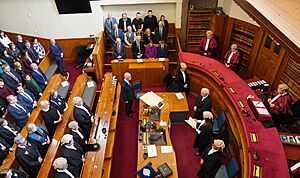
How Long They Serve
The First Minister's time in office is not directly tied to the four-year term of the Scottish Parliament. However, Parliament elections happen every four years. An early election can happen if two-thirds of the MSPs vote for it. If a majority of MSPs vote that they have no confidence in the First Minister, a new First Minister must be nominated within 28 days. If no one is chosen, an early election will be called.
The First Minister stays in office until they resign, are removed, or pass away. If a First Minister resigns because Parliament no longer supports them, an interim (temporary) First Minister is appointed. This happens until Parliament chooses a new person. The First Minister is supported by their Chief of Staff to the First Minister, who advises them on important plans.
Powers of the First Minister
Scottish Law and Civil Service
The First Minister suggests people to the King or Queen for important legal jobs. These include the Lord Advocate and the Solicitor General for Scotland. They also have a role in appointing and removing Scottish judges.

The First Minister also chooses the Permanent Secretary to the Scottish Government. This person is the most senior civil servant in Scotland. The First Minister is in charge of how the civil service works in Scotland.
Security and Emergencies
The First Minister's office handles reports about security and intelligence. During big emergencies, like floods or terror attacks, the First Minister leads the Scottish Government Resilience Room (SGoRR). This group helps plan how Scotland will respond to major events.
The First Minister is responsible for different levels of emergency response in Scotland. If a crisis affects the whole United Kingdom, the First Minister works with the UK Government. They might attend meetings at the UK Government's emergency room, called COBRA.
Keeper of the Great Seal
The First Minister is also the Keeper of the Great Seal of Scotland. This is a very old and important role. The Great Seal is used to make official documents valid. The First Minister can also sign royal warrants for the King or Queen.
For example, in 2023, First Minister Humza Yousaf oversaw the Stone of Scone leaving Scotland. It went to Westminster Abbey for the Coronation of Charles III and Camilla.
Privy Council Membership
The First Minister becomes a member of the Privy Council. This is a group of important advisors to the King or Queen. Being a member means they can use the title 'Right Honourable'.
The First Minister advises the King or Queen on some matters. These include suggesting Scottish people for honours and awards. They also advise on appointing certain officials in Scotland. The First Minister also advises the King or Queen directly on appointing Scottish Ministers and judges.
Leading the Government
The First Minister is the head of the Scottish Government. They are in charge of creating and sharing the government's policies. They also promote Scotland both at home and around the world. The First Minister's powers are explained in the Scotland Act 1998.
Cabinet Appointments
After being appointed, the First Minister chooses other ministers to be part of the Scottish Cabinet. These ministers are then formally approved by the Scottish Parliament. The First Minister can remove ministers from their roles at any time. They also appoint the top legal officers, like the lord advocate, with Parliament's support.
Answering to Parliament
The First Minister is responsible to the Scottish Parliament for their actions. Members of the Scottish Parliament (MSPs) can ask the First Minister questions. This happens during First Minister's Questions (FMQs) every Thursday. This 30-minute session allows MSPs to ask about any topic. Leaders of other parties get to ask questions each week.
The First Minister can also give speeches to Parliament. After a speech, MSPs can ask questions about what was said. For example, at the start of each new parliamentary term, the First Minister usually explains the government's plans.
International Relations
While foreign policy is mostly handled by the UK Government, the Scottish Government and the First Minister can promote Scotland's economy and interests globally. They encourage businesses and other governments to invest in Scotland. The First Minister often travels to other countries to do this.
Past First Ministers have made many international visits. For example, Donald Dewar visited Belgium and Japan. Jack McConnell visited many countries, including the United States and South Africa. He also helped create the Scotland Malawi Partnership in 2004. This group helps connect people and organizations in Scotland and Malawi.
Alex Salmond also made many overseas visits, including to the United States and China. After the Brexit vote, Nicola Sturgeon visited Brussels to discuss Scotland's future with the European Union. Humza Yousaf also visited Brussels in 2023 to talk about Scotland's relationship with the European Union.
Current First Minister John Swinney has also met with leaders from other countries. In June 2024, he welcomed the President of Zambia to Bute House. He also visited Munich, Germany, to promote Scottish culture and tourism.

Membership in Groups
The First Minister is part of several important groups. These include the Prime Minister and Heads of Devolved Governments Council and the British-Irish Council. They represent Scotland at these meetings. First Ministers also sometimes attend meetings at the United Nations. For example, Nicola Sturgeon spoke at the United Nations General Assembly in 2017 about gender equality.
Deputy First Minister
The First Minister is supported by a Deputy First Minister. This role is not officially set out in law, but it is an important position. The Deputy First Minister is also an elected member of the Scottish Parliament.
Sometimes, the Deputy First Minister acts as 'acting' First Minister. This happens if the First Minister is away or unable to do their job. For example, Jim Wallace became acting First Minister twice. Once was after the death of Donald Dewar, and again after Henry McLeish resigned. The Deputy First Minister does not automatically become the new First Minister if the position becomes empty.
Special Privileges
The First Minister is the Keeper of the Great Seal of Scotland. This means they have a high rank in Scotland. They are allowed to fly the Royal Banner of Scotland.
The First Minister receives a salary for their role. As of April 2015, the First Minister's total salary was £144,687. This includes their salary as an MSP. The First Minister is the highest-paid member of the Scottish Government.
The First Minister usually lives at Bute House in Edinburgh. This house is owned by the National Trust for Scotland. Before devolution, it was the home of the Secretary of State for Scotland. Weekly Cabinet meetings happen there. The First Minister also holds press conferences and meets important visitors at Bute House. The main office of the First Minister is at St Andrews House in Edinburgh.
- Privileges of office of First Minister
-
Official Residence, Bute House at 6 Charlotte Square in Edinburgh
-
The First Minister has an office within the Scottish Parliament building
List of Nominating Elections
| Party key | Scottish Conservatives | |
|---|---|---|
| Scottish Labour | ||
| Scottish Liberal Democrats | ||
| Scottish National Party | ||
| Scottish Greens | ||
| Scottish Socialist Party | ||
| Independent |
| Parliamentary term | Date | Candidates | Votes received |
|---|---|---|---|
| 1st Parliament | 13 May 1999 | Donald Dewar | 71 |
| Alex Salmond | 35 | ||
| David McLetchie | 17 | ||
| Dennis Canavan | 3 | ||
| 26 October 2000 | Henry McLeish | 68 | |
| John Swinney | 33 | ||
| David McLetchie | 19 | ||
| Dennis Canavan | 3 | ||
| 22 November 2001 | Jack McConnell | 70 | |
| John Swinney | 34 | ||
| David McLetchie | 19 | ||
| Dennis Canavan | 3 | ||
| 2nd Parliament | 15 May 2003 | Jack McConnell | 67 |
| John Swinney | 26 | ||
| David McLetchie | 18 | ||
| Robin Harper | 6 | ||
| Tommy Sheridan | 6 | ||
| Dennis Canavan | 2 | ||
| Margo MacDonald | 2 | ||
| 3rd Parliament | 16 May 2007 | Alex Salmond | 49 |
| Jack McConnell | 46 | ||
| 4th Parliament | 18 May 2011 | Alex Salmond | 68 |
| 19 November 2014 | Nicola Sturgeon | 66 | |
| Ruth Davidson | 15 | ||
| 5th Parliament | 17 May 2016 | Nicola Sturgeon | 63 |
| Willie Rennie | 5 | ||
| 6th Parliament | 18 May 2021 | Nicola Sturgeon | 64 |
| Douglas Ross | 31 | ||
| Willie Rennie | 4 | ||
| 28 March 2023 | Humza Yousaf | 71 | |
| Douglas Ross | 31 | ||
| Anas Sarwar | 22 | ||
| Alex Cole-Hamilton | 4 | ||
| 7 May 2024 | John Swinney | 64 | |
| Douglas Ross | 31 | ||
| Anas Sarwar | 22 | ||
| Alex Cole-Hamilton | 4 |
Timeline of Scottish First Ministers

See also
 In Spanish: Ministro principal de Escocia para niños
In Spanish: Ministro principal de Escocia para niños
- List of current heads of government in the United Kingdom and dependencies
 | James B. Knighten |
 | Azellia White |
 | Willa Brown |


